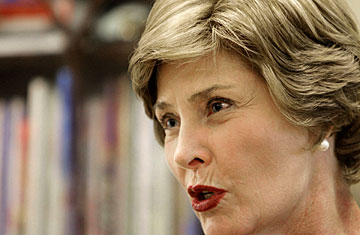
First Lady Laura Bush talks about Burma with reporters at the White House, Wednesday, Sept. 5, 2007
U.S. First Lady Laura Bush rarely speaks out strongly on foreign affairs. One exception: Burma. She has been a consistent critic of the military junta and a supporter of jailed opposition leader Aung San Suu Kyi. In May, she worked with 16 women Senators to draft and sign a letter to U.N. Secretary General Ban Ki-Moon, calling for the U.N. to pressure the Burmese regime to release Suu Kyi. The following month, Mrs. Bush wrote an op-ed piece in the Wall Street Journal, lamenting the fact that Suu Kyi was spending her 62nd birthday while under house arrest. She called Ban again last week, to voice her concern over the Burmese military's latest crackdown on protests against price hikes. The First Lady spoke to TIME's Hannah Beech about the latest anti-regime protests in Burma. Excerpts:
"I've been interested in Burma for a long time. I hosted a roundtable during the UNGA [United Nations General Assembly] last year. I've been briefed by Ibrahim Gambari [the U.N. Secretary General's special advisor on Burma].
"Like many people, especially women, I got interested because of Aung San Suu Kyi, and I learned about Burma and how she represents the hopes of the people of Burma, and how those hopes were being dashed by her house arrest and the fact that her party won the elections and never had the opportunity to have power at all. I did work with women Senators to make sure we sent out a letter to Ban Ki-Moon. I've also met with ethnic minorities and talked with them.
"One of the things that's really important for the world to know is that the people of Burma do listen to radio — to Radio Free Asia, to the BBC — and when they hear that people around the world are speaking out for their rights, I think it gives them hope.
"It's important for governments to put as much pressure [as possible] on the military regime to listen to the people. That's all these protesters are asking to do. That's what national reconciliation is about. [The people of Burma] don't want violence or civil war.
"I'm very pleased to read [British Prime Minister] Gordon Brown's statement that he's going to be involved in the issue. The Chinese arranged [for] the U.S. to informally meet with the regime, and that's important. It wasn't effective, but I think it's time for us to talk to China, Thailand, Russia, India, countries that are physically, geographically, as well as economically close to Burma. Our sanctions don't mean that much because of other countries who take the benefit of Burma's natural resources. I'm very concerned about the teak forests, I'm worried about the Burmese people's patrimony being sold.
"I hope that Gambari will do an informal briefing to the Security Council, and [that the Council will put Burma on its agenda]. We've seen that for the last 17 years, the generals have become more and more isolated. They've built a new capital in the center of the country. We never seem to get any response, even when the meeting was facilitated by the Chinese.
"What can we really do, what can we do for national reconciliation? Certainly, one thing we can do to work toward national reconciliation in Burma is for the Security Council to speak out formally. Will that work? I don't know. But it's the least we can do. That's what Aung San Suu Kyi wants, she wants a diplomatic reconciliation. Those are the first things we can do and then move from there.
"I don't think many Americans know about Burma. Darfur they know, because the press has covered it. But most Americans don't know about Aung San Suu Kyi. But that's the point of talking about it, to let people talk about it. The Burmese I've met, they want our affection. They want to know that we know what's happening there. Anytime an American speaks out, they hear about it. It's important for other countries to join in on that. That's why I'm so happy about Gordon Brown.
"[President Bush] is in Sydney now, and this will be a topic of discussion, with Association of Southeast Asian Nations, and with President Hu of China, and, well, everyone that's there at APEC."
